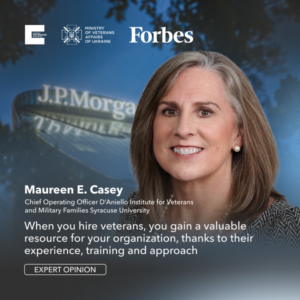After the end of the war, Ukraine is waiting for the return of more than a million veterans. They will have unique skills, knowledge and career aspirations. How can companies prepare for a meeting – so that both sides win? The team of the Ukrainian Veterans Foundation asked the American veteran employment leader Maureen Casey about this.
In 2022, JP Morgan ranked 95th in the ranking of the most veteran-friendly companies, which has been compiled by Forbes USA for three years. Their best solutions?
The company has 270,000 employees and mentoring support programs for ex-servicemen. Veterans are offered to try themselves in different departments to find an opportunity to make an ideal career.
The recruiting team has hired more than 10,000 veterans since the readjustment began in 2011, helping them retrain, gain new qualifications and ease their transition back into civilian life.
Another direction is the Veteran Jobs Mission campaign. JP Morgan and other organizations have pledged to employ 100,000 veterans over 10 years. This mission brought together 200 companies and quickly exceeded commitment, employing more than 240,000 veterans in less than three years.
Maureen Casey is behind these programs. She headed the military department of the company. Since 2015, Casey has been theChief Operating Officer for the D’Aniello Institute for Veterans and Military Families – IVMF at Syracuse University.
What were the main conclusions she made while working with veterans in the private sector – and what can be useful for Ukrainians from the experience of American companies? Forbes spoke with Casey in cooperation with the Ukrainian Veterans Foundation.
JP Morgan has been working on veteran onboarding for over 10 years. What did you learn during this time?
JPMorgan’s Military and Veterans Affairs Initiative began in 2011. At that time, the unemployment rate among veterans in the United States was almost twice as high as it is now.
JPMorgan Chairman and CEO Jamie Dimon decided to assess the problem and spoke to several company executives. He concluded: we can create tangible employment opportunities for veterans. They have many valuable skills: adaptability, problem solving, leadership, teamwork.
Thus, the Veterans Job Mission was born. We have come together as a group of national corporations to realize and carry this trend across the organization.
We realized that it was more than just attracting and hiring them. How to train them when they come to the company, how to develop and how to retain them?
Not sure what experience the Ukrainian army has, but in the US army you change positions every two or three years. We needed not only to transfer veterans to the private sector – we had to prepare companies. Talk about military culture, what veterans can bring, and their expectations.
We recruited a group of veterans for a summer internship. They cooperated with civilians. One of the veterans asked why other employees were constantly in the chief’s office. He said: “It’s usually very bad in the army to be under a boss or commander all the time.” We had to explain to him and others that part of the opportunity for future employment was to build a relationship with a supervisor. So we had to train on both sides of the equation.
Another task is to help veterans describe their own contribution to teamwork. They, in a sense, give up individuality and function as a team because life depended on it. The main idea is to convey to them: success in the private sector requires explaining to people what your individual contribution to the general effort is.
One of the biggest takeaways for me is that onboarding veterans is about more than engaging and hiring them. We must give them the tools to succeed. Once we do that, they will surpass their colleagues in values and skills.
Why should companies hire veterans? What skills and qualities do they differ them from other workers?
Leadership, teamwork, and adaptability skills are valued in companies. This is what military personnel have been doing all this time. They are very flexible. They know how to communicate well. The US military operates in 100 different countries, so part of their military training is understanding how to function in unique and diverse environments.
We have to teach them to transfer these skills to the corporate culture. On the other hand, we have to teach this adaptation to managers. It was especially difficult at first because less than 1% of the US population served after 9/11. People did not have a common understanding of the nature of military service. If someone describes their military experience on their resume, many hiring managers don’t understand it. It is difficult for them to understand how this person who served in the combat infantry will fit the company. Helping both parties understand technical and other skills is important.
The company has a mentoring program, JPMorgan Chase’s Pathfinder Mentoring Program. Why is the mentoring institute important for adaptation of veterans?
The program came about after I left JPMorgan, so I’ll talk about it in general terms. Having a mentor familiar with how the company works and being able to ask questions can be critical to a veteran’s success. Questions may arise – sometimes such that he would be embarrassed to ask a manager or a colleague. It’s important to have a trusted peer mentor outside of whatever line of business you’re in that you can brainstorm with, talk to, and ask questions to help set you up for success.
After the victory, one and a half million Ukrainian soldiers will return to peaceful life. What should every Ukrainian company do for the comfortable return and work of veterans – regardless of profile and field of activity?
First, they need time. The transition from military service cannot be underestimated. Life in a rhythm of incredible stress, high pressure and risk – how do they transition from this to civilian life?
Second, employers can analyze where they need to hire. What skill sets are required? How can we help veterans in transition know and understand the opportunities available to them?
I’ve been doing this job for 12 years, and our biggest challenge is still ensuring that transitioning military personnel and veterans see all the opportunities available to them.
What is the most non-obvious thing to pay attention to when preparing a program for the reintegration of veterans?
It is to have the ability and desire to learn. Spend more time understanding the skills and aspirations of military personnel transitioning to civilian life. Just because someone was a tank driver in the military doesn’t mean they want to drive a truck when they get back. We need to understand what skills they need to acquire, what their employment goals are, and offer tools to upskill or reskill them and make a smooth transition to work. One of the things we do at IVMF (Institute for Veterans and Military Families) is training programs from JPMorgan and other companies that focus on successful employment. We have to have an end-to-end solution and it doesn’t have to be complex. The key is to understand what the veteran wants from a career perspective. What programs can we offer to help them achieve their goal? At the same time, we can say to employers, “Look, we have a pool of talent interested in cybersecurity or infrastructure recovery opportunities.” We create a clear path from the transition period to new employment opportunities. Read the rest of the interview at this link (https://forbes.ua/leadership/virishennya-problem-adaptivnist-komandna-robota-jpmorgan-naymae-veteraniv-u-ssha-vzhe-12-rokiv-yaki-instrumenti-mozhe-zapozichiti-v-nikh-ukrainskiy-biznesu-intervyu-12062023-14127?fbclid=IwAR0ezE7kRdX6FiwJXpk0QKM1pohJRFVLQuFTAoGs9Ot_qHmcEOml54MIvaA).


